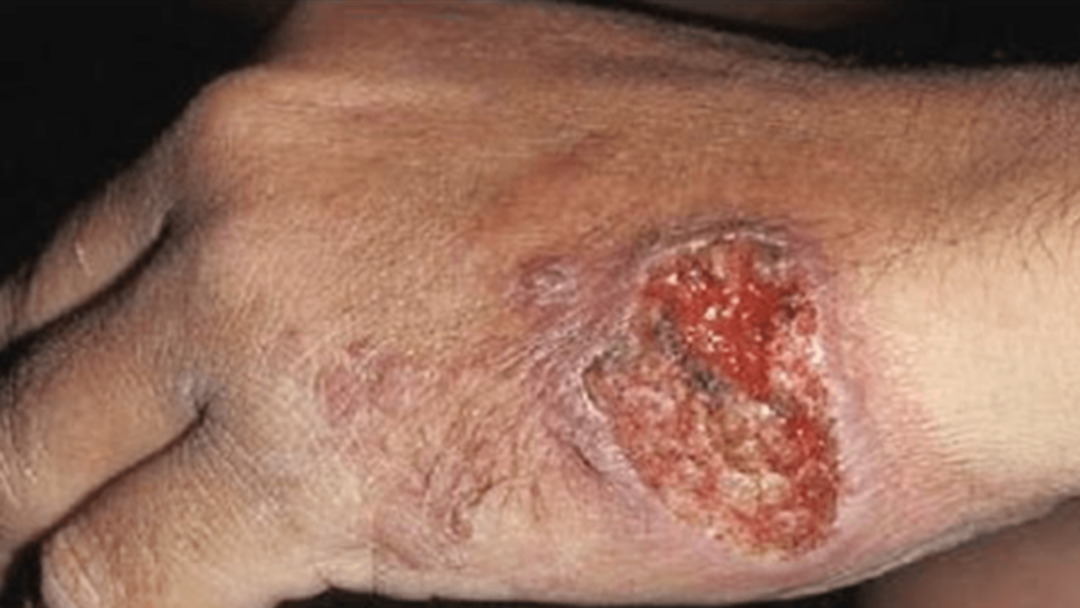-
Shortage of health centres in Afrin leads to the spread of Leishmania

Shortage of health centres in Afrin leads to the spread of Leishmania
There have been many severe cases during recent months among the people in the villages of Afrin suffering from leishmania disease - or, as is known in slang language (Aleppo acne) -. The situation becomes worse because these villages are far from the centre of Afrin city, with a complete shortage of treatment centres which treat this germ.
This disease is concentrated in the villages of Raju, Belbel and Maidanki, which is about 35 km away from the centre of Afrin. It is a mountainous and rugged area, and its inhabitants depend on the local centres to obtain their needs. The main reason behind this disease is that the rubbish is transported in irregular periods, where it is collected in centres close to these villages, which led to leishmania spread.
Sawsan Sheikho a school teacher in Hajiko Fuqani in Raju district, told the Levant News about the spread of the disease: "there are several conditions that have contributed in the increasing number of cases of Leishmania germs. One of those conditions is the primitive nature of these villages in terms of sewage systems and the absence of municipal councils".
She added: "the distance between these villages and the city centre, and its mountainous roads, alongside the increasing of temperature, preceded by climatic changes that formed swamps after heavy rains at the beginning of the summer, all those factors created a suitable environment for mud wasp".
Regarding the number of injuries, Sawsan pointed out that most are from children, for example,80 pupils from 200 in her school have been affected, in addition to many injuries among adults in these villages where there are no treatment centres or campaigns to stop the spread of these germs among the residents.
We tried to get an accurate number of casualties and official statistics for all the villages of Afrin, but that was impossible because of lack in offices which follow up the cases and the dependence on Turkish institutions, especially after the military operation "Olive Branch" and the control of armed factions supported by Turkey on Afrin, in addition to the difficulty of obtaining official permits from them.
"Mahmoud al-Khalid," one of the displaced people from northern Homs who inhabited these villages under the reconciliation agreement, stated to the Levant News: "this virus has recently spread significantly, and the treatment is considered too expensive in case the patient has transportation, adding that the journey to travel to the treatment centre takes about two hours and it costs five thousand Syrian pounds, and the patient needs about ten sessions per month, and this is out of our financial capacity. Confirming that those who do not have transportation and money for treatment are getting worse. The case might develop to skin oedema, and might get worse because of primitive treatment methods such as wild herbs.
In spite of this disease existence a long time ago, the deteriorating condition of the medical foundation has worsened this situation and turned it into a disaster that might be difficult to control in future.
Tags
You May Also Like
Popular Posts
Caricature
BENEFIT Sponsors BuildHer...
- April 23, 2025
BENEFIT, the Kingdom’s innovator and leading company in Fintech and electronic financial transactions service, has sponsored the BuildHer CityHack 2025 Hackathon, a two-day event spearheaded by the College of Engineering and Technology at the Royal University for Women (RUW).
Aimed at secondary school students, the event brought together a distinguished group of academic professionals and technology experts to mentor and inspire young participants.
More than 100 high school students from across the Kingdom of Bahrain took part in the hackathon, which featured an intensive programme of training workshops and hands-on sessions. These activities were tailored to enhance participants’ critical thinking, collaborative problem-solving, and team-building capabilities, while also encouraging the development of practical and sustainable solutions to contemporary challenges using modern technological tools.
BENEFIT’s Chief Executive Mr. Abdulwahed AlJanahi, commented: “Our support for this educational hackathon reflects our long-term strategic vision to nurture the talents of emerging national youth and empower the next generation of accomplished female leaders in technology. By fostering creativity and innovation, we aim to contribute meaningfully to Bahrain’s comprehensive development goals and align with the aspirations outlined in the Kingdom’s Vision 2030—an ambition in which BENEFIT plays a central role.”
Professor Riyadh Yousif Hamzah, President of the Royal University for Women, commented: “This initiative reflects our commitment to advancing women in STEM fields. We're cultivating a generation of creative, solution-driven female leaders who will drive national development. Our partnership with BENEFIT exemplifies the powerful synergy between academia and private sector in supporting educational innovation.”
Hanan Abdulla Hasan, Senior Manager, PR & Communication at BENEFIT, said: “We are honoured to collaborate with RUW in supporting this remarkable technology-focused event. It highlights our commitment to social responsibility, and our ongoing efforts to enhance the digital and innovation capabilities of young Bahraini women and foster their ability to harness technological tools in the service of a smarter, more sustainable future.”
For his part, Dr. Humam ElAgha, Acting Dean of the College of Engineering and Technology at the University, said: “BuildHer CityHack 2025 embodies our hands-on approach to education. By tackling real-world problems through creative thinking and sustainable solutions, we're preparing women to thrive in the knowledge economy – a cornerstone of the University's vision.”
opinion
Report
ads
Newsletter
Subscribe to our mailing list to get the new updates!






















